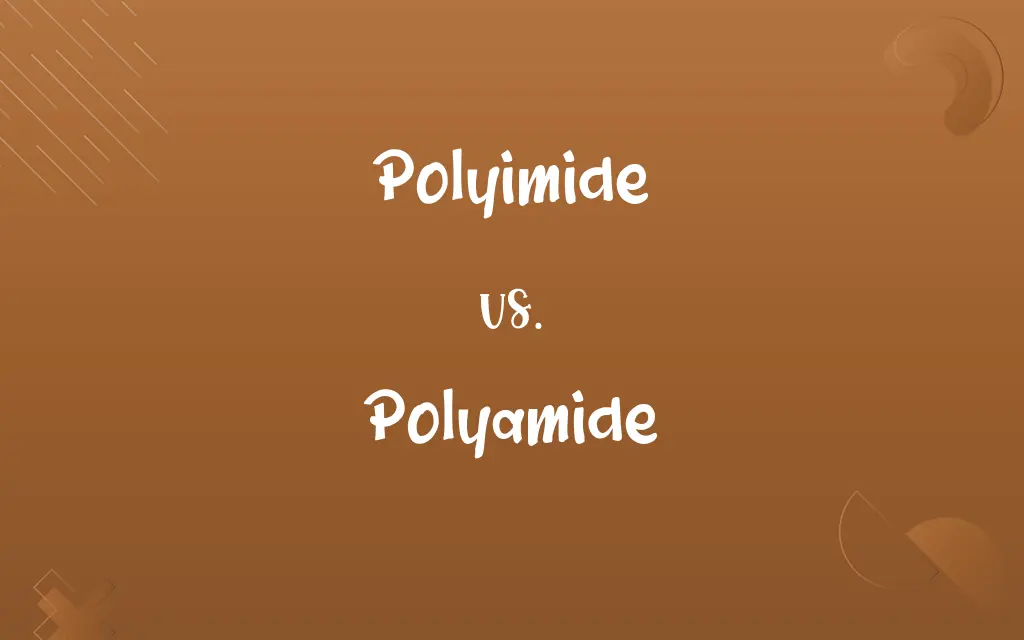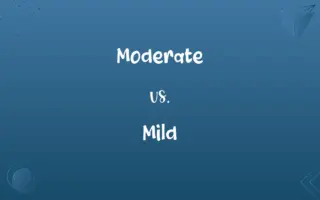Polyimide vs. Polyamide: Know the Difference

By Shumaila Saeed & Dua Fatima || Published on November 30, 2024
Polyimide is known for its exceptional heat resistance and electrical insulation properties, whereas polyamide, commonly known as nylon, is valued for its strength, flexibility, and wear resistance.

Key Differences
Polyimides are a group of polymers known for their ability to withstand extreme temperatures, making them ideal for high-heat applications like aerospace components. Polyamides, on the other hand, are more commonly recognized for their use in textiles and plastics, offering excellent mechanical strength and elasticity.
Dua Fatima
Nov 30, 2024
The chemical structure of polyimides allows for their high thermal stability, which is why they're used in electronics for insulation and in high-temperature environments. Polyamides, with their repeating amide groups, provide resilience and durability, which is why they're found in everything from automotive parts to clothing.
Shumaila Saeed
Nov 30, 2024
Polyimides stand out due to their low electrical conductivity, making them suitable for electronic and electrical components. Polyamides, while also used in electrical applications, are more prized for their abrasion resistance and toughness.
Shumaila Saeed
Nov 30, 2024
When it comes to environmental resistance, polyimides are resistant to a wide range of chemicals and do not easily degrade in harsh environments. Polyamides, though durable, can absorb moisture, which may affect their mechanical properties and dimensional stability.
Dua Fatima
Nov 30, 2024
Polyimides are often used in specialized applications due to their unique properties and higher cost, such as in the aerospace, automotive, and electronics industries. Polyamides are more versatile, used widely in consumer goods, automotive components, and textiles, balancing cost and performance effectively.
Shumaila Saeed
Nov 30, 2024
ADVERTISEMENT
Comparison Chart
Heat Resistance
Extremely high, suitable for aerospace
High but less than polyimides
Dua Fatima
Nov 30, 2024
Electrical Insulation
Excellent, used in electronics
Good, but not as effective as polyimides
Shumaila Saeed
Nov 30, 2024
Common Applications
Aerospace, electronics, automotive
Textiles, plastics, automotive parts
Dua Fatima
Nov 30, 2024
ADVERTISEMENT
Polyimide and Polyamide Definitions
Polyimide
They are used in high-performance applications.
Polyimide composites are utilized in advanced automotive designs.
Shumaila Saeed
Mar 01, 2024
Polyamide
Commonly used in wear-resistant materials.
Polyamide gears are chosen for their toughness and longevity.
Hifza Nasir
Mar 01, 2024
Polyimide
Polyimides are used for their high heat resistance.
Polyimide films are essential for insulation in aerospace electronics.
Dua Fatima
Mar 01, 2024
Polyamide
They absorb moisture, affecting properties.
Polyamide components may swell in humid conditions.
Hifza Nasir
Mar 01, 2024
Polyimide
Known for excellent electrical insulation.
Polyimide tape is used to insulate wiring in high-temperature environments.
Shumaila Saeed
Mar 01, 2024
ADVERTISEMENT
Polyamide
Polyamides are versatile, used in many industries.
Polyamide films are utilized in food packaging for their strength.
Hifza Nasir
Mar 01, 2024
Polyimide
Polyimides resist chemical degradation.
Polyimide coatings protect components from harsh chemicals.
Dua Fatima
Mar 01, 2024
Polyamide
Known as nylon, used in consumer goods.
Nylon (polyamide) is popular for its use in clothing and accessories.
Shumaila Saeed
Mar 01, 2024
Polyimide
Polyimides maintain properties in extreme conditions.
Polyimide seals are employed in high-temperature industrial processes.
Hifza Nasir
Mar 01, 2024
Polyamide
Polyamides are known for strength and flexibility.
Polyamide fibers are widely used in durable textiles.
Shumaila Saeed
Mar 01, 2024
Polyimide
A synthetic polymer, containing repeating imide groups, that is resistant to high temperatures, wear, and corrosion, used primarily as a coating or film.
Shumaila Saeed
Mar 01, 2024
Polyamide
A polymer containing repeated amide groups, as in various kinds of nylon.
Shumaila Saeed
Mar 01, 2024
Repeatedly Asked Queries
Why are polyamides widely used in textiles?
Polyamides offer a combination of strength, elasticity, and resistance to wear and tear, making them ideal for durable and flexible textiles.
Shumaila Saeed
Nov 30, 2024
What is the main difference between polyimide and polyamide?
The main difference lies in their heat resistance and application areas, with polyimides being superior in thermal stability and used in more high-heat environments.
Dua Fatima
Nov 30, 2024
Can polyimides be used in everyday products?
While possible, their high cost and specialized properties make them more common in industrial and high-tech applications than everyday products.
Shumaila Saeed
Nov 30, 2024
Are polyimides environmentally resistant?
Yes, polyimides exhibit excellent resistance to chemicals and do not degrade easily in harsh environments.
Shumaila Saeed
Nov 30, 2024
Can polyamides be engineered for better heat resistance?
While polyamides can be modified for improved heat resistance, they generally cannot match the thermal stability of polyimides.
Hifza Nasir
Nov 30, 2024
How do environmental factors affect polyimides and polyamides?
Polyimides are largely unaffected by environmental factors, while polyamides can absorb moisture, which may impact their mechanical properties.
Hifza Nasir
Nov 30, 2024
Is cost a factor in choosing between polyimides and polyamides?
Yes, polyimides are generally more expensive, which is why they are chosen for specific applications where their unique properties are required.
Hifza Nasir
Nov 30, 2024
Are there different types of polyamides?
Yes, there are several types of polyamides, including Nylon 6, Nylon 66, and others, each with unique properties for different applications.
Dua Fatima
Nov 30, 2024
Can polyamides be recycled?
Yes, polyamides can be recycled, which is beneficial for reducing waste and promoting sustainability.
Shumaila Saeed
Nov 30, 2024
Can the moisture absorption of polyamides be a disadvantage?
Yes, in applications where dimensional stability is critical, the moisture absorption of polyamides can affect their mechanical properties.
Dua Fatima
Nov 30, 2024
Why are polyimides preferred in aerospace applications?
Their ability to maintain mechanical and electrical properties at extreme temperatures makes them ideal for aerospace components.
Hifza Nasir
Nov 30, 2024
What are the limitations of using polyimides?
The main limitations are their cost and processing requirements, which can make them less accessible for general consumer applications.
Hifza Nasir
Nov 30, 2024
How do polyamides and polyimides differ in electrical insulation?
Polyimides offer superior electrical insulation compared to polyamides, making them more suitable for electronic applications.
Shumaila Saeed
Nov 30, 2024
What makes polyimides suitable for chemical resistance?
Their chemical structure provides stability and resistance to a wide range of chemicals, making them suitable for use in harsh chemical environments.
Shumaila Saeed
Nov 30, 2024
What industries benefit the most from polyimide applications?
Aerospace, electronics, and automotive industries benefit significantly from the use of polyimides due to their high heat resistance and electrical insulation.
Shumaila Saeed
Nov 30, 2024
Share this page
Link for your blog / website
HTML
Link to share via messenger
About Author
Written by
Shumaila SaeedShumaila Saeed, an expert content creator with 6 years of experience, specializes in distilling complex topics into easily digestible comparisons, shining a light on the nuances that both inform and educate readers with clarity and accuracy.
Co-written by
Dua Fatima






























































